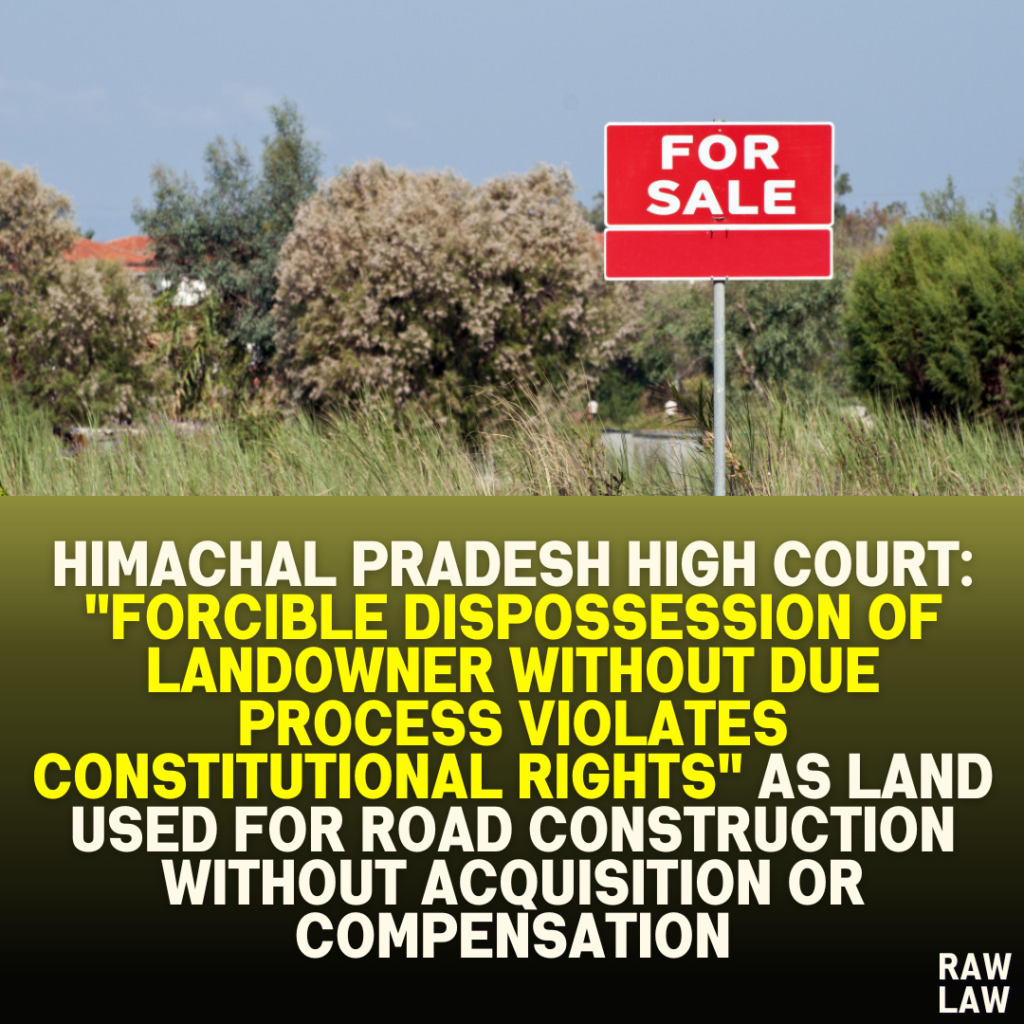Court’s Decision:
The Himachal Pradesh High Court dismissed the appeal filed by the appellants, affirming the decision of the Single Judge to compensate the respondent for the use of their land without proper acquisition. The Court found no merit in the appeals and upheld the previous judgment.
Facts:
The respondent’s land was used by the appellants to construct a road without acquiring the land or providing any compensation. The respondent approached the Court, seeking directions for the appellants to acquire the land and compensate them in a timely manner.
Issues:
Whether the appellants could rely on delay and laches to avoid compensating the respondent.
Whether the respondent had voluntarily donated the land during the road construction, as claimed by the appellants.
Petitioner’s Arguments:
The appellants argued that there was considerable delay in filing the appeal and that the respondent had voluntarily donated the land for the road’s construction. They also raised the issue of laches.
Respondent’s Arguments:
The respondent contended that the land was forcibly taken without following due process of law, in violation of both human and constitutional rights, specifically under Article 300A of the Constitution of India.
Analysis of the Law:
The Court analyzed the judgments of the Supreme Court in Vidya Devi vs. State of Himachal Pradesh and Sukh Dutt Ratra vs. State of Himachal Pradesh, wherein it was held that delay and laches could not be raised in cases involving continuing violations of land rights, particularly when private property is dispossessed without legal procedure.
Precedent Analysis:
The Court cited the Supreme Court judgments that emphasized that forcibly dispossessing a person of private property without due process is violative of their human and constitutional rights.
Court’s Reasoning:
The Court agreed with the learned Single Judge’s reliance on previous judgments that delay and laches could not be invoked when there is a continuing cause of action. The plea that the land was voluntarily donated was not legally valid.
Conclusion:
The High Court dismissed the appeals and upheld the Single Judge’s decision, directing the appellants to compensate the respondent. No costs were imposed.
Implications:
The judgment reinforces the principle that delay and laches are not sufficient defenses in land acquisition cases involving continuing violations, and that private property rights cannot be infringed upon without following due legal procedure.




Pingback: Supreme Court Grants Bail to V Senthil Balaji in PMLA Case: Cites Manish Sisodia and K.A. Najeeb Rulings, Stating "Statutory Provisions for Denying Bail Cannot Violate Constitutional Rights” - Raw Law
Pingback: Delhi High Court Holds Respondent in Contempt for Willful Disobedience of Restraining Order: "Disobedience Must Be Deliberate and Intentional, With Full Knowledge of the Consequences"; Orders Respondent to Appear in Person for Sentencing Hearing
Pingback: Bombay High Court Grants Bail in Conspiracy and Murder Case, Citing Inadmissibility of Co-Accused's Confessional Statement Against Applicant, Weakening Prosecution’s Case - Raw Law
Pingback: Supreme Court Reverses High Court’s Order for Further Investigation Citing Lack of Justifiable Grounds: ‘Fishing and Roving Enquiries Cannot Be Allowed Merely to Delay Justice’ - Raw Law